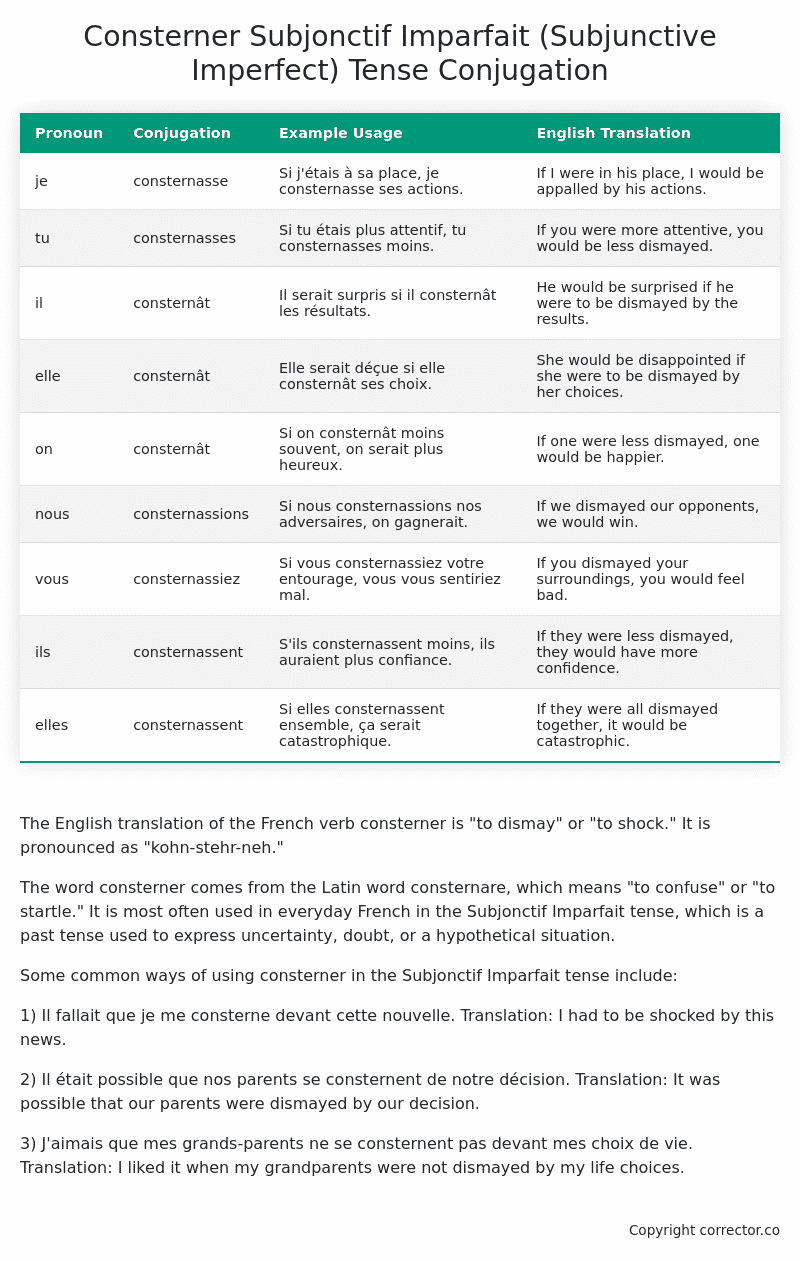Subjonctif Imparfait (Subjunctive Imperfect) Tense Conjugation of the French Verb consterner
Introduction to the verb consterner
The English translation of the French verb consterner is “to dismay” or “to shock.” It is pronounced as “kohn-stehr-neh.”
The word consterner comes from the Latin word consternare, which means “to confuse” or “to startle.” It is most often used in everyday French in the Subjonctif Imparfait tense, which is a past tense used to express uncertainty, doubt, or a hypothetical situation.
Some common ways of using consterner in the Subjonctif Imparfait tense include:
1) Il fallait que je me consterne devant cette nouvelle.
Translation: I had to be shocked by this news.
2) Il était possible que nos parents se consternent de notre décision.
Translation: It was possible that our parents were dismayed by our decision.
3) J’aimais que mes grands-parents ne se consternent pas devant mes choix de vie.
Translation: I liked it when my grandparents were not dismayed by my life choices.
Table of the Subjonctif Imparfait (Subjunctive Imperfect) Tense Conjugation of consterner
| Pronoun | Conjugation | Example Usage | English Translation |
|---|---|---|---|
| je | consternasse | Si j’étais à sa place, je consternasse ses actions. | If I were in his place, I would be appalled by his actions. |
| tu | consternasses | Si tu étais plus attentif, tu consternasses moins. | If you were more attentive, you would be less dismayed. |
| il | consternât | Il serait surpris si il consternât les résultats. | He would be surprised if he were to be dismayed by the results. |
| elle | consternât | Elle serait déçue si elle consternât ses choix. | She would be disappointed if she were to be dismayed by her choices. |
| on | consternât | Si on consternât moins souvent, on serait plus heureux. | If one were less dismayed, one would be happier. |
| nous | consternassions | Si nous consternassions nos adversaires, on gagnerait. | If we dismayed our opponents, we would win. |
| vous | consternassiez | Si vous consternassiez votre entourage, vous vous sentiriez mal. | If you dismayed your surroundings, you would feel bad. |
| ils | consternassent | S’ils consternassent moins, ils auraient plus confiance. | If they were less dismayed, they would have more confidence. |
| elles | consternassent | Si elles consternassent ensemble, ça serait catastrophique. | If they were all dismayed together, it would be catastrophic. |
Other Conjugations for Consterner.
Le Present (Present Tense) Conjugation of the French Verb consterner
Imparfait (Imperfect) Tense Conjugation of the French Verb consterner
Passé Simple (Simple Past) Tense Conjugation of the French Verb consterner
Passé Composé (Present Perfect) Tense Conjugation of the French Verb consterner
Futur Simple (Simple Future) Tense Conjugation of the French Verb consterner
Futur Proche (Near Future) Tense Conjugation of the French Verb consterner
Plus-que-parfait (Pluperfect) Tense Conjugation of the French Verb consterner
Passé Antérieur (Past Anterior) Tense Conjugation of the French Verb consterner
Futur Antérieur (Future Anterior) Tense Conjugation of the French Verb consterner
Subjonctif Présent (Subjunctive Present) Tense Conjugation of the French Verb consterner
Subjonctif Passé (Subjunctive Past) Tense Conjugation of the French Verb consterner
Subjonctif Imparfait (Subjunctive Imperfect) Tense Conjugation of the French Verb consterner (this article)
Subjonctif Plus-que-parfait (Subjunctive Pluperfect) Tense Conjugation of the French Verb consterner
Conditionnel Présent (Conditional Present) Tense Conjugation of the French Verb consterner
Conditionnel Passé (Conditional Past) Tense Conjugation of the French Verb consterner
L’impératif Présent (Imperative Present) Tense Conjugation of the French Verb consterner
L’infinitif Présent (Infinitive Present) Tense Conjugation of the French Verb consterner
Struggling with French verbs or the language in general? Why not use our free French Grammar Checker – no registration required!
Get a FREE Download Study Sheet of this Conjugation 🔥
Simply right click the image below, click “save image” and get your free reference for the consterner Subjonctif Imparfait tense conjugation!

Consterner – About the French Subjonctif Imparfait (Subjunctive Imperfect) Tense
Formation
Common Everyday Usage Patterns
Interactions with Other Tenses
Subjonctif Présent
Indicatif Passé Composé
Conditional
Conditional Perfect
Summary
I hope you enjoyed this article on the verb consterner. Still in a learning mood? Check out another TOTALLY random French verb conjugation!


